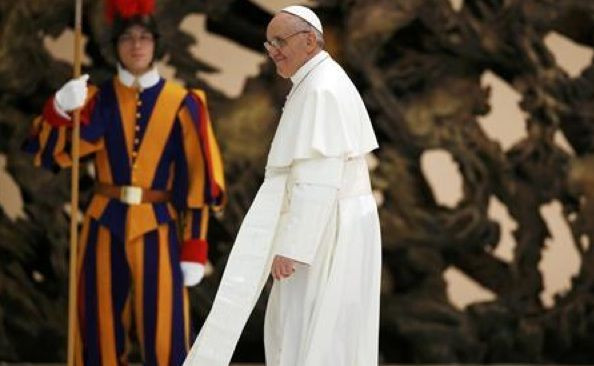What Is Maundy Thursday? Pope Francis To Wash Prisoners’ Feet For Pre-Easter Holy Thursday Tradition

Newly elected Pope Francis will wash the feet of inmates at a juvenile detention center near Rome on Maundy Thursday, a pre-Easter tradition that commemorates Christ’s Last Supper.
The 12 selected inmates range in age from 16 to 21 and include volunteers as well as those who were given invitations to help them “overcome their embarrassment or self-consciousness,” the Catholic News Agency reported.
In most Western denominations, Maundy Thursday (also known as “Holy Thursday,”) marks the end of Lent and the middle of the Holy Week leading up to Easter. According to the BBC, thousands of Catholics are still travelling to Rome to participate in Holy Week, which also includes Palm Sunday, Good Friday and Holy Saturday.
The ceremonial washing of the feet and the symbolism of the number 12 comes from Christ’s act of humility in washing the feet of the 12 Apostles at the Last Supper. Although the foot washing ceremony is one of the most central traditions of Maundy Thursday, it’s usually performed in one of Rome’s basilicas. This Maundy Thursday will mark the first time that it’s been held at Casal del Marmo detention centre.
Prison chaplain Father Gaetano Greco told CNA that he hoped the pope’s decision would “make them see that their lives are not bound by a mistake, that forgiveness exists and that they can begin to build their lives again.”
“But all of them are very happy, and the visit will make them think, reconsider and understand that there are people in this world who are concerned for them,” Greco said, adding that many of the inmates came from broken families. “That Pope Francis himself is concerned for them is very significant, because it exposes this problem that so many disadvantaged boys and girls are experiencing.”
The pope’s unorthodox move comes days after a Cuban cardinal released a handwritten note that Cardinal Bergoglio had read aloud to fellow cardinals before he was installed as pope. In the document, Bergoglio criticized the church for not looking outside of itself. "When the church does not emerge from itself to evangelize, it becomes self-referential and therefore becomes sick," Bergoglio said, in a translation according provided by the Associated Press. "The evils that, over time, occur in ecclesiastical institutions have their root in self-referentiality, a kind of theological narcissism."
“When the church is self-referential, inadvertently, she believes she has her own light ... and gives way to that very serious evil, spiritual worldliness ... living within herself, of herself, for herself,” he added.
The archibishop of Havana described Bergoglio’s speech as “clear” and “masterful.”
© Copyright IBTimes 2024. All rights reserved.




















